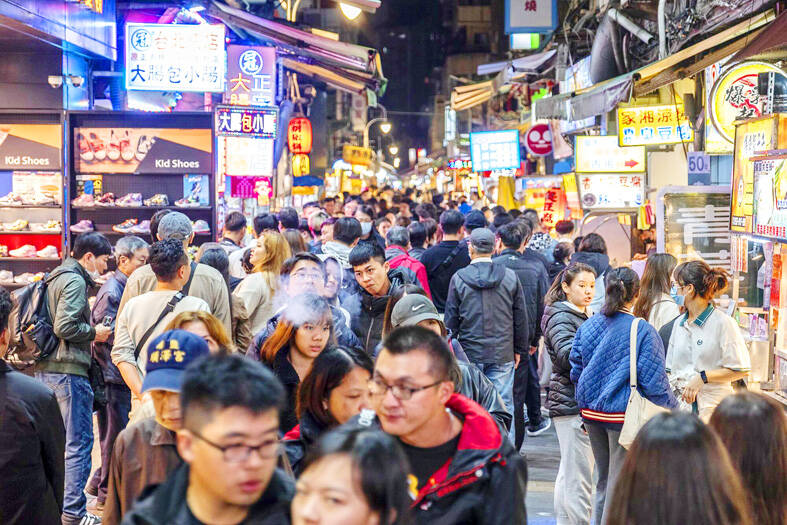Taiwan’s economy might expand 3.1 percent next year, faster than the 1.1 percent growth estimated for this year, as inventory adjustments would end this quarter, allowing restocking demand to increase, Standard Chartered Bank Taiwan said yesterday.
Demand for consumer electronics might return to growth next year following several quarters of downcycles induced by sharp global inflation and monetary tightening, Standard Chartered senior economist Tony Phoo (符銘財) told a media briefing in Taipei.
That would benefit local firms in supply chains for such products, Phoo said.

Photo, Lam Yik Fei, Bloomberg
Business in the US, Europe and Japan has showed signs of improving after global inflation eased and major central banks halted rate hikes, he said, adding that these factors would facilitate a resumption in growth for Taiwan’s exports next year, while private investment would stop being a drag.
Semiconductor shipments have accounted for 38.7 percent of Taiwan’s exports so far this year, thanks to fast-growing global demand for advanced chips, Ministry of Finance data showed.
China, Taiwan’s largest export destination, is expected to report a better economic performance next year, as Beijing is likely to roll out more measures to support its infrastructure and property sector, Phoo said.
Chinese tourists would contribute to Taiwan’s tourism sector if the two sides allow greater civilian exchanges after Taiwan’s presidential election next month, he said.
Taiwan’s consumer prices might increase 2.2 percent year-on-year this year, but grow 1.5 percent next year, which would give the central bank reason to leave policy rates intact at its quarterly board meeting tomorrow, he said.
The domestic property market would also come out of the woods next year after dodging a hard landing this year, Phoo said.
The property market’s resilience has much to do with relatively low borrowing costs and prudent financial planning by homebuyers, he said.

When an apartment comes up for rent in Germany’s big cities, hundreds of prospective tenants often queue down the street to view it, but the acute shortage of affordable housing is getting scant attention ahead of today’s snap general election. “Housing is one of the main problems for people, but nobody talks about it, nobody takes it seriously,” said Andreas Ibel, president of Build Europe, an association representing housing developers. Migration and the sluggish economy top the list of voters’ concerns, but analysts say housing policy fails to break through as returns on investment take time to register, making the

‘SILVER LINING’: Although the news caused TSMC to fall on the local market, an analyst said that as tariffs are not set to go into effect until April, there is still time for negotiations US President Donald Trump on Tuesday said that he would likely impose tariffs on semiconductor, automobile and pharmaceutical imports of about 25 percent, with an announcement coming as soon as April 2 in a move that would represent a dramatic widening of the US leader’s trade war. “I probably will tell you that on April 2, but it’ll be in the neighborhood of 25 percent,” Trump told reporters at his Mar-a-Lago club when asked about his plan for auto tariffs. Asked about similar levies on pharmaceutical drugs and semiconductors, the president said that “it’ll be 25 percent and higher, and it’ll

CHIP BOOM: Revenue for the semiconductor industry is set to reach US$1 trillion by 2032, opening up opportunities for the chip pacakging and testing company, it said ASE Technology Holding Co (日月光投控), the world’s largest provider of outsourced semiconductor assembly and test (OSAT) services, yesterday launched a new advanced manufacturing facility in Penang, Malaysia, aiming to meet growing demand for emerging technologies such as generative artificial intelligence (AI) applications. The US$300 million facility is a critical step in expanding ASE’s global footprint, offering an alternative for customers from the US, Europe, Japan, South Korea and China to assemble and test chips outside of Taiwan amid efforts to diversify supply chains. The plant, the company’s fifth in Malaysia, is part of a strategic expansion plan that would more than triple

Taiwanese artificial intelligence (AI) server makers are expected to make major investments in Texas in May after US President Donald Trump’s first 100 days in office and amid his rising tariff threats, Taiwan Electrical and Electronic Manufacturers’ Association (TEEMA, 台灣電子電機公會) chairman Richard Lee (李詩欽) said yesterday. The association led a delegation of seven AI server manufacturers to Washington, as well as the US states of California, Texas and New Mexico, to discuss land and tax issues, as Taiwanese firms speed up their production plans in the US with many of them seeing Texas as their top option for investment, Lee said. The